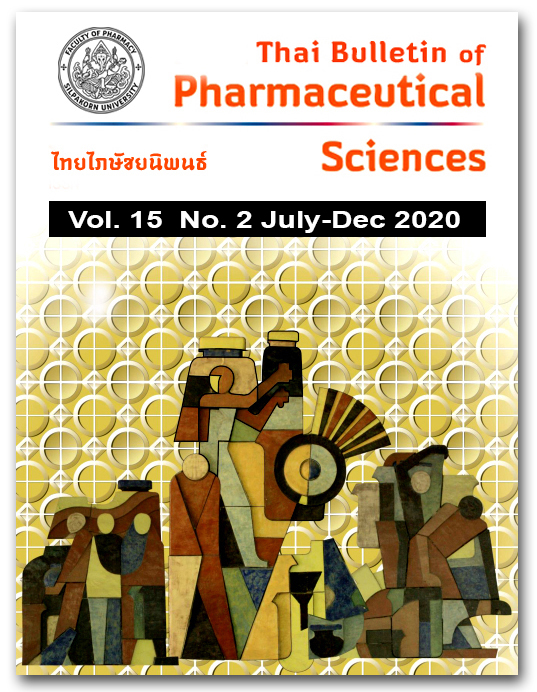PREVALENCE, KNOWLEDGE, ATTITUDE AND BEHAVIOR OF RATIONAL USES OF ANTIBIOTICS AND STEROID-ADULTERATED HEALTH PRODUCTS AMONG THE ELDERLY IN SURATTHANI PROVINCE
DOI:
https://doi.org/10.69598/tbps.15.2.81-94Keywords:
leftover drugs, irrational use of antibiotics, steroid, risky health products, steroid adulterationAbstract
The purpose of this cross-sectional research is to study the prevalence, knowledge, attitude, and behavior of rational uses of antibiotics and steroid-adulterated health products and comparison results of knowledge, attitude, and behavior with population characteristics. The sample size is the elderly in Suratthani from 6 districts, with the elderly from one sub-district in each of the six districts being sampled. The data, compiled during October 2019 – January 2020 from 591 household surveys and interviews of 618 samples, revealed that leftover antibiotics were discovered 9.32 percent, while risky health products were discovered 31.64 percent. Moreover, testing by means of test kits were steroids at 69.44 percent (50 of 72 samples). In terms of knowledge, attitude, and behaviors towards antibiotics use, the majority (54.21 percent) described antibiotics as anti-inflammatory drugs, with an average score of positive knowledge, positive attitude, and positive behaviors equal to 2.44±1.94, 1.83±1.717 and 2.74±1.44 (out of full marks of 6, 4 and 4). In terms of knowledge, attitude, and behaviors towards risky health product use, only 26.90 percent of the respondents knew what steroids were. Among those who did, 55.35 percent understood its prescription, 69.81 percent understood the side effects arising from the continual usage of steroids. The average score of positive knowledge and positive behavior equaled 2.60±1.90 and 4.51±1.70 (out of full marks of 5 and 6). Comparison between variables, 1) the sample size with different age also exhibited different knowledge on antibiotics usage with statistical significance (F=3.165, p-value=0.043). 2) The sample size of different ages exhibited differences in antibiotics usage with statistical significance (F=4.407, p-value=0.013). 3) The difference in sample size of different ages is correlated in steroid-adulterated health product usage with statistical significance. (F=5.535, p-value=0.004). 4) The difference in education level also exhibited different attitudes towards antibiotics usage with statistical significance (F=3.904, p-value=0.021). 5) The difference in education level exhibited different attitudes towards steroid-adulterated health product usage with statistical significance (F=5.535, p-value= 0.004). 6) The difference in education level (χ2=25.26, p-value<0.001) and 7) the difference in age (χ2=30.45, p-value<0.001) was correlated to steroid knowledge.
References
Office of Science and Technology, Royal Thai Embassy, Brussels. Management of antimicrobial resistance with whole genome sequencing (WGS) technology. Sci Technol Brussels Newsl [Internet]. 2019 [cited 2019 Dec 11](5):1-5. Available from: https://www.thaiscience.eu/uploads/ journal_20190717160308-pdf.pdf (in Thai)
Hfocus News Agency. Rational drug use hospital [Internet]. Udon Thani: Hfocus; 2016 [Cited 2019 Dec 11]. Available from: https://www.hfocus.org/content/2016/07/12427 (in Thai)
The Medical News. Steroid problem evil for health damage of Thai people [Internet]. Bangkok: Wongkarnpat; 2014 [Cited 2019 Dec 11]. Available from: http://wongkarnpat.com/viewya.php?id=1262#.Xfh7vugzYdV (in Thai)
Kiatying-Angsulee N. The control of steroid distribution. Ya-wipak [Internet]. 2014 [cited 2019 Dec 11];6(22):1-7. Available from: http://www.thaidrugwatch.org/download/ series/series22.pdf (in Thai)
Pumtong S. Report of drug safety in community project 2018-2019 [Internet]. Nonthaburi: Food and Drug Administration; 2019 [cited 2019 Dec 11]. Available from: http://ndi.fda.moph.go.th/uploads/sensible_file/20191118101736.pdf (in Thai)
Siengjaew C, Nimdet K, Suwan N, Makchumnum P, Thongchim W, Phetprodit N. The project promotes safe drug in the community. Surat Thani Province, 2018. Reg 11 Med J. 2019;33(1):231-42. (in Thai)
Saweksap S, Lerkiatbundit S, Yongpraderm S. Effects of telephone follow-up for reducing noncompliance to oral amoxycillin. Thai J Pharm Pract. 2012;4(1):17-27. (in Thai)
Manee S. Prevalence of medicine and steroid adulterated health products among elderly in Phayao Province. Phayao: Phayao Provincial Public Health Office. 2017. (in Thai)
Angkanavisul T, Musikachai P. Lessons learned from the project on drug safety management within community by engaging the network of partners in Phra Nakhon Si Ayutthaya during 2015-2017. Thai J Pharm Pract. 2018;10(1):142-60. (in Thai)
Panya R. Effects of the intervention on steroid adulterated health products at the communities in the catchment area of Khun Lan Sub-district Health Promoting Hospital, Dok Kham Tai District, Phayao. Thai J Pharm Pract. 2019;11(3):552-63. (in Thai)
Mongkolchaipak J, Ruamsuk J, Chaiprateep A. The study of customer’s knowledge and behavior in using antibiotics at community drug store in Pathum Thani Province. EAU Herit J. 2012;6(2):91-100. (in Thai)
Asipong S. Health product use behavior with no medical indications among patients with chronic diseases at Rasi Salai, Sisaket Province. Thai J Pharm Pract. 2015;7(2):105-13. (in Thai)
Plengchai S. Transformation of steroids adulterated in medicine to food. Ya-wipak [Internet]. 2014 [cited 2019 Dec 11];6(22):20-2. Available from: http://www.thaidrugwatch. org/download/series/series22.pdf (in Thai)
Downloads
Published
How to Cite
Issue
Section
License
All articles published and information contained in this journal such as text, graphics, logos and images is copyrighted by and proprietary to the Thai Bulletin of Pharmaceutical Sciences, and may not be reproduced in whole or in part by persons, organizations, or corporations other than the Thai Bulletin of Pharmaceutical Sciences and the authors without prior written permission.



